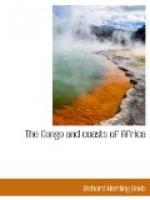Forestry and Mining Company one-half of the profits
go to Leopold, one-fourth to Belgians, and the remaining
fourth to the Americans. Of the profits of the
American Congo Company, Leopold is entitled to one-half
and the Americans to the other half. This company
was one originally organized to exploit a new method
of manufacturing crude rubber from the plant.
The company was taken over by Thomas F. Ryan and his
associates. Back of both companies are the Guggenheims,
who are to perform the actual work in the mines and
in the rubber plantation. Early in March a large
number of miners and engineers were selected by John
Hays Hammond, the chief engineer of the Guggenheim
Exploration Companies, and A. Chester Beatty, and were
sent to explore the territory granted in the mining
concession. Another force of experts are soon
to follow. The legal representative of the syndicates
has stated that in the Congo they intend to move “on
commercial lines.” By that we take it they
mean they will give the native a proper price for
his labor; and instead of offering “bonuses”
and “commissions” to their white employees
will pay them living wages. The exact terms of
the concessions are wrapped in mystery. Some
say the territories ceded to the concessionaires are
to be governed by them, policed by them, and that within
the boundaries of these concessions the Americans
are to have absolute control. If this be so the
syndicates are entering upon an experiment which for
Americans is almost without precedent. They will
be virtually what in England is called a chartered
company, with the difference that the Englishmen receive
their charter from their own government, while the
charter under which the Americans will act will be
granted by a foreign Power, and for what they may
do in the Congo their own government could not hold
them responsible. They are answerable only to
the Power that issued the charter; and that Power
is the just, the humane, the merciful Leopold.
The history of the early days of chartered companies
in Africa, notoriously those of the Congo, Northern
Nigeria, Rhodesia, and German Central Africa does
not make pleasant reading. But until the Americans
in the Congo have made this experiment, it would be
most unfair (except that the company they choose to
keep leaves them open to suspicion) not to give them
the benefit of the doubt. One can at least say
for them that they seem to be absolutely ignorant of
the difficulties that lie before them. At least
that is true of all of them to whom I have talked.
The attorney of the Rubber Company when interviewed
by a representative of a New York paper is reported
to have said: “We have purchased a privilege
from a Sovereign State and propose to operate it along
purely commercial lines. With King Leopold’s
management of Congo affairs in the past, or, with what
he may do in an administrative way in the future,
we have absolutely nothing to do.”
The italics are mine.




